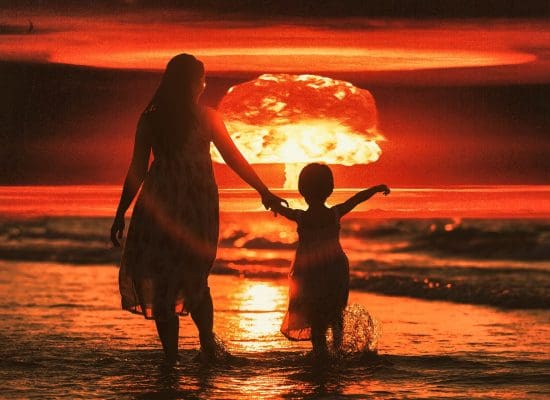Post photo: dragon | © Pixabay
The statement still applies today Albert Einsteinthat “nationalism [is] a childhood disease, the measles of mankind, so to speak.” After all these years, even after two world wars and countless deaths, mankind has failed to eradicate the deadliest of diseases.
Even in Germany, you can still get a good 20% of the vote with a single “Sieg Heil”. All nationalists have one thing in common: they assume - regardless of whether they can read, write or only have a fair command of their native language - that they are better than the rest of the world simply because of their birth. That's why they think that they work the most, hardest and best, are the most intelligent beings on God's earth and therefore everything is due to them first; the rest of humanity is human garbage. That is why nationalism always gives birth to imperialism, even to the point of the desire for world domination.
The umpteenth wave of nationalism is now rolling across our planet and has reached the most populous countries, including the People's Republic of China under its leader Xi Jinping. He places himself entirely in the tradition of the greatest known nationalists and wants to make China the greatest, if not the sole, world power. In doing so, he breaks with an ancient Chinese tradition that was still content with being the Middle Kingdom and allowed the "periphery" to continue to live independently.
The first consequences of this Chinese nationalism can be seen well inside China, where minorities are becoming increasingly concentrated, if not reduced; these measures that can be observed are not solely due to totalitarianism, which would proceed unreservedly against all critics of the regime.
However, China has learned from the attempts of other nationalists and has done its homework. You don't want to achieve everything at once, you don't put everything on one card either, but instead embark on a "long march" again and don't take it easy on yourself. After achieving autonomy, people are now trying to achieve self-sufficiency and also allow themselves the first claims to power as a future hegemon, because nationalism can never be hidden for long. And so the goals are officially set and are also gladly made known to the interested public: including replacing the USA as the first economic and military power, securing all world resources and controlling all transport routes, as well as dominance in space.
Nationalism also likes to be combined with megalomania and so on Xi Jinping not only refrained from wanting to solve the Taiwan question exclusively peacefully, but also fatally set a binding deadline for it – namely within his own reign. Since the Chinese are reluctant to lose face, we must now assume that this is not just mere rhetoric or just another Chinese attempt at intimidation. In addition, we must assume that the Taiwanese will hardly be able to be persuaded back to Reich by peaceful means, mainly because Xi Jinping makes it absolutely clear to the whole world what happens to those who think differently and is not interested in human rights or international agreements, which can be seen very well in Hong Kong or the Uyghurs.
That is why the world must now take a very close look at the Chinese alternatives, because it cannot be assumed that around 1,5 billion Chinese will develop a megalomania similar to the 70 million self-proclaimed Aryans — they will calculate the bill in advance, with these may well have rounding errors in the amount of plus minus one hundred million dead.
China's declared opponent is the USA, with whom it has been competing economically for years and is now also contesting its Pacific interests. In addition, China is openly trying to occupy the opposite coast of the USA in the Pacific. Taiwan is only the first step, South Korea and Japan will follow. However, China is aware that the United States will remain able to prevent this step and continue to secure its opposite coast in the Pacific for decades to come, unless it is forced to secure its opposite Atlantic coast in Europe.
But here, too, the Chinese are pushing ahead economically and meanwhile also with the first military feelers. The Chinese may see it as particularly successful – and certainly really enjoy it – that they have now turned what is left of their former big brother into their little brother and, in the Russian Federation, have gained a “partner” that is increasingly increasing the pressure on Europe and checks to what extent Europe or even the USA are willing to make concessions. The European nationalists in particular are already reacting and are not yet sure which side they will ultimately agree to. The USA has long been examining whether the British Isles will be sufficient to temporarily protect the opposite Atlantic coast, and the Europeans would be well advised to consider what the Chinese will not only do with the Russian Federation if they are successful, but whether and how they will do it themselves continue to prosper under China's influence.
The greater challenge for China is likely to be in these considerations, above all because the Chinese themselves will hardly be able to afford a two-front war, how the Republic of India will behave with a good 1,5 billion people. Especially since India Narendra Modi also has a nationalist in power and as a result is making claims of its own in Asia that are unlikely to be compatible with those of China. Here we can follow how China is already testing this question again with military means. Luckily for China, nationalist India is weakened by its own "Muslim problem" and will not be able to exploit the advantage of winning over its 150 million Muslims and thus also hundreds of millions of Muslims in neighboring countries any time soon, which means that China is waging a war on two fronts could save at least for the first time.
This would now be a good opportunity for China, after Hong Kong has finally been brought into line, to use the willingness of Europe and other parts of the West to accept China's gains in East Asia, analogous to Hitler's occupation of the Sudetenland and Austria in 1938 or Putin's occupation of Crimea and eastern Ukraine in 2014, to acquire Taiwan as the next stopover — as already announced.
The necessary military prerequisites are slowly but surely being met: the Chinese fleet will be able to bind the fleets of the USA, Japan and South Korea in such a way that an invasion of Taiwan will be possible.
Through its space program, China is also about to reach the point where it can at least get involved in space, which has been a sine qua non for modern warfare for the past few decades.
The countless hacker attacks also show that China will be able to dominate the communication spaces, especially if all communication channels and means depend on Chinese technology.
China will even be able to hold its own in so-called information warfare. And should the conflict have a nuclear component, we can ensure that this will be limited to tactical nuclear strikes on the high seas or in space.
China has secured the resources necessary to wage war and will not be isolated from the rest of the world due to a regional war. It is more likely that China will receive a wide range of support.
So nothing seems to stand in the way of an invasion of Taiwan, and I can already see the newspaper articles and reports before my eyes that will compare this with German reunification.
If one follows the classics of the art of war — which the Chinese know quite well and can also read some of them in their own native language — such a military action, namely to conquer the Republic of Taiwan (population approx. 25 million) would be fraught with further uncertainties and could drag on to the point where the rest of the world would eventually react. There is no lack of corresponding role models in recent history.
Therefore, it cannot be ruled out that the Chinese have already gone one step further and will combine the annexation of Taiwan with a first strike using bioweapons, which would be very sensible from a purely military point of view and is not a problem at all from a nationalist point of view.
This use of biological warfare agents would at least paralyze a potential Indian front in the long term and keep the western world busy with itself for the time being — the charm of this: the own population, allies and countries that behave neutrally get the antidote delivered, the rest have resources for the development and distribution of the antidote and, when it's all over, may no longer be interested in worrying about a single island and the fate of its inhabitants - especially since new biowarfare agents are always very easy to spread.
In view of all this, one might well wonder whether COVID-19 was a test or just a tragic accident during the trials Xi Jinpings meeting deadlines.
And finally, to answer my own question, all nationalism is a danger to all of us, and it doesn't matter where it comes from.
"Nationalism is power hunger tempered by self-deception."
george orwell, Notes on Nationalism (1945)







